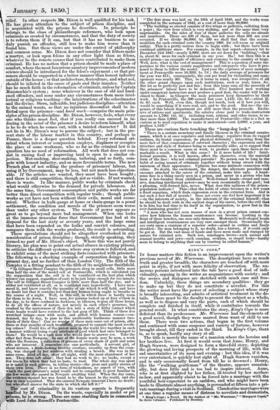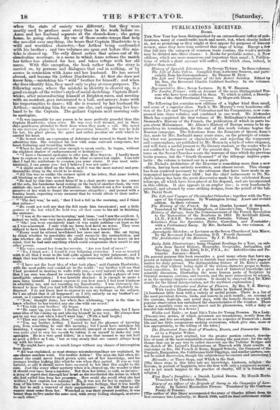KING'S COPE. * IN lesser matters this fiction is an improvement
upon the writer's previous novel of Mr. Warrenne. The descriptions have as much truth and greater breadth; the characters are touched off with more point in style, if not with more felicity of observation. The nu- merous persons introduced into the tale have a good deal of indi- viduality, arguing in the writer an aoquaintance with society ; and the scenes and dialogues are sketched with much ease and free- dom. Unluckily, these things are secondary qualities : they go to make up but they do not constitute a novelist. For this the writer must have the power of selecting a subject whose story is broadly interesting, and admits of artistieal treatment in the de- tails. There must be the faculty to present the subject as a whole, as well as to dispose and vary the parts, each of which should be complete and finished in itself, while it contributes towards the general result. In what constitutes the story, Iring's Cope is more deficient than its predecessor. Mr. Warrenne had the elements of a good novel, though they were marred from want of skill to use them. There were two actions, that bean in the first volume and continued with some suspense and variety of fortune, however brought about, till they ended in the third. In King's Cope, there is, so to speak, hardly any story at all. The title is merely the name of a mansion where the heroine and her brothers live. At first it would seem that Anne, Henry, and Hugh Scawen, were designed to form a threefold story, depicting the glowing and loving prospects of the morning of life, with the sad uncertainties of its noon and evening : but this idea, if it was ever entertained, is quickly lost sight of. Hugh Scawen vanishes, and is only occasionally heard from till he is drowned ; Henry, like the " walking gentleman " of the theatre, appears occasion- ally, but does little and is too bad to inspire interest. Anne, who is at first slighted by her father, ill-treated by her mother- in-law, and apparently about to be forced into a marriage with the youthful heir-expectant to an earldom, and who might have been made to illustrate almost anything, is persuaded at fifteen into a pri- vate marriage during a visit in Scotland. Clandestine marriages were at one time a regular means of distress to novelists and dramatists., • King's Cope; a Novel. By the Author of "Mr. Warrenne," "Margaret CapeL" In three volumes. Published by Bentley.
when the state of society was different ; but they were mostly used to produce more story than in the work before us. Anne and her husband separate at the church-door ; she going home, he going abroad. By one of those centre-temps that help
the novelist over anything, she hears that Captain Harduicke is a -wild and worthless character,—her Arthur being confounded with his brother ; and two volumes are spun out before this mid- hake is cleared up. The only direct action that arises out of the clandestine marriage, is a scene in which Anne refuses the match her father has planned for her, and takes refuge with her old nurse. With this exception, the book rather than the story is carried on, by persons and dialogues that end in nothing, or by scenes in connexion with Anne and her husband. He has served abroad, and become Sir Arthur Ilanhvicke. At first she does not know him,—mistaking his " wild " brother for himself ; and when she does identify him, they meet only to play at cross _purposes. The following scene, where the mistake in identity is cleared up, is a good example of the writer's style of social sketching. Captain-ilard- wieke, after miaconducting himself at Brighton races, and meeting with an accident, goes intoxicated to a ball, and annoys Anne with his importunities to dance ; till she is rescued by her husband Sir Arthur,—mistaking him for some one else, and supposing her hus- band to be the Captain. The gallant Captain next morning calls to apologize.
"It was impossible for any person to be more perfectly graceful than this Captain Hardwick° when sober. He was very well dressed, and in these • 'days gentlemen attended to their dress when they made a call. She noted' in one nervous glance his manner of presenting himself; the way he held his hat, his glace gloves, the quiet and rather peculiar air with which he carried his head.
"Ile bowed with an expression of deference that seemed to thank her for admitting him. She returned his bow with some outward composure, her heart fluttering and trembling within.
" When he laid advanced near enough to speak easily, he began, without the slightest shadow of embarrassment or hesitation- " I have a thousand apologies to offer you, Miss Soawen. I hardly know how to express to vou my contrition for what occurred last night I am told that I had the misfortune to occasion you some alarm. It was most unin- tentional,
I can assure you : but I believe I was not quite—' "A slight smile filled up the blank, as if it was the most natural and gen- tlemanlike thing in the world to be drunk.
4' All this was so unlike the earnest spirit of his letter, that Anne looked, all blushing as she was, into his face.
"He had by this time seated himself in a chair pretty near to her corner /of the sofa, his handsome hand resting on the beck of another chair, the very attitude she used to notice at Parldndale. She faltered out a few words ex- pressive of her wish to forget the occurrence altogether ; and paused with a beating heart, expecting every moment that he would allude to their unfor- tunate position.
- " 4" The fact was,' he said, that I had a fall in the morning, and I think that rather—'
"He could not well my that the fall made him intoxicated ; and a little gesture of the hat which he held was all that came to his aid in finishing the sentence.
" ' I was at the races in the morning,' said Anne, "and I saw the accident. I, indeed we both, were very much alarmed. It looked so frightful at a distance.' "'Oh! you were excessively kind—it was really nothing—at least as far Its was concerned. I only wish my horse had fared no worse. They were obliged to have him shot immediately; which was a horrid bore.'
-ery word he uttered bewildered her more and more. She sat trying to think whether bypossibility she could reconcile the contradiction, and alma whether she could venture to allude to what weighed so heavy on her mind, that he had said anything which could compromise their secret to any other person. "His voice roused her from her reverie. Are you fond of races ? '
" No, I think not ; I found it very fatiguing yesterday. I was so wearied with it all that I went to the ball quite against my hotter judgment ; and I think that was the reason I was so—so easily overcome,' said. Anne, trying to smile.
" t I have not the least idea of what took place,' said Captain Hardwick°, with the most polite and candid air in the world : my brother told nie that I had persisted in desiring to waltz with you,—a very natural wish, and one that I am sure was shared by everybody in the room (with a glance of very intelligible admiration.) I was hoiribly shacked: it is enough to make a man hang himself. I esimot express to you how much I feel your kindness in admitting me, and not resenting my importunity. I was extremely dis- tressed to hear that you had left the ballroom in consequence, absolutely in- d. I do not know how to express to you my feelings on the subject, fbrT am afraid that it all happened ; so I rely entirely on my brother's ac- count, as I cannot trust to my own recollection.' ' Now,' thought Anne, her whole face whitening, now is the time to know whether he has trusted any one else with our secret.'
"'You told your brother,' she began.
" 'He came up, you know : I declare I don't in remember, but I have some idea of his coming up and placing himself m my way. He always does get, in my way just when I don't want him.' (With a halt laugh.) "'That was your brother, then!' exclaimed Anne. "'Yew, my brother Arthur. I fancied he had the pleasure of knowing you, from something he said this morning; but I must have mistaken his meaning, I suppose : he was so excessively annoyed at what passed, that I was quite glad to stop his mouth by taking it on myself to make my own apologies. He is a very good fellow,' in a tone that -seemed to say not half In good a fellow as I am, but so very steady that one cannot always keep sip with his ideas.'
He might have gone on much longer without any chance of interruption from Anne.
"All was explained, as moat strange misunderstandings are explained, by one change careless word. His brother Arthur ! The man she had often de- aleared oho could never forget grown quite out of her knowledge, and his younger brother looking like what he was when they parted. It was so very natural, so odd it should never hare occurred to her that this might be the case. Just like every other mystery when it is cleared up, the wonder is that it should ever have been a mystery. But then her letter, so cold, so decisive • a pang of regret shot through her heart as she recollected the terms in which ahe had exiled him from her presenni. How could she recall what she had written ? how explain her mistake ?. .No, it was not for her to explain : the tone of his letter was so conclusive as to his own feelings, that it AILS hardly for her to seek n renewal of their acquaintance : no, she felt that no ad- yams must mine from her. Wretched as was their present position, it WM better than to live under the same roof, with every feeling changed, or averse to each other."
It































 Previous page
Previous page